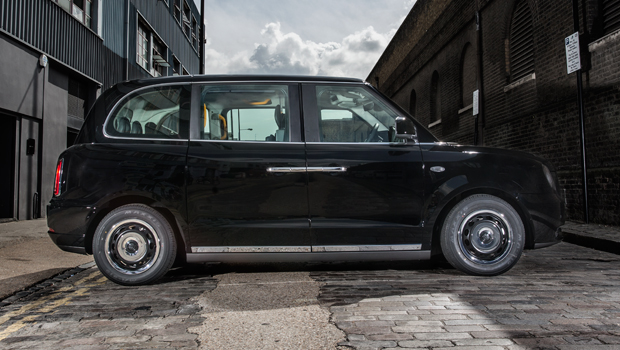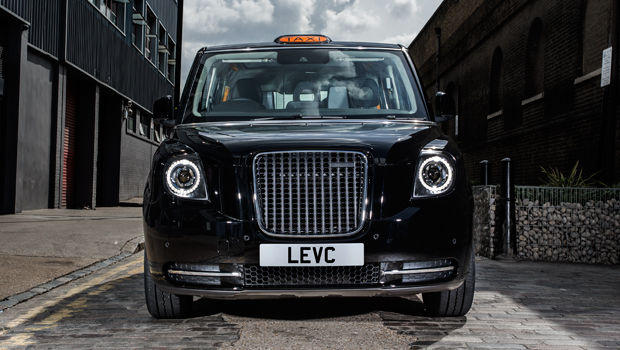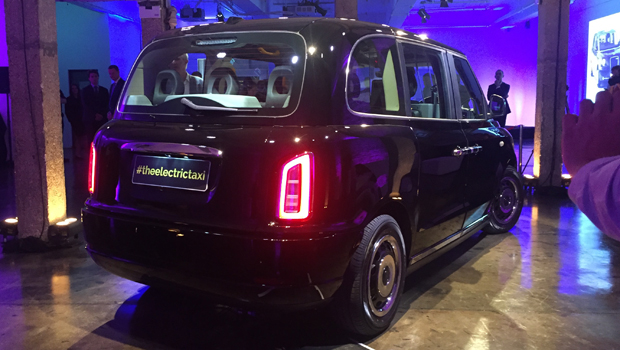LEVC: Geely designs electric cab to push beyond Britain
 London’s electric taxi has been unveiled in its final design today and the Geely-owned subsidiary used the occasion for a revamp of the brand. Now dubbed LEVC (for London EV Company, formerly London Taxi Company), the firm hopes to extend its range beyond the British border and has found one new customer already. Dutch RMC put a pre-order over 225 so-called TX cabs in. Plus, the order books for the UK will open on August, 1. Nora Manthey was at the launch and spoke to LEVC’s CEO Chris Gubbey and Mike Hedges of Unite union of taxi drivers. In summary, LECV and London face three huge challenges: growth, competition, and charging infrastructure.
London’s electric taxi has been unveiled in its final design today and the Geely-owned subsidiary used the occasion for a revamp of the brand. Now dubbed LEVC (for London EV Company, formerly London Taxi Company), the firm hopes to extend its range beyond the British border and has found one new customer already. Dutch RMC put a pre-order over 225 so-called TX cabs in. Plus, the order books for the UK will open on August, 1. Nora Manthey was at the launch and spoke to LEVC’s CEO Chris Gubbey and Mike Hedges of Unite union of taxi drivers. In summary, LECV and London face three huge challenges: growth, competition, and charging infrastructure.
Growing from an icon to an export item
There are two types of taxis in London. The licensed black cabs with drivers you can hail on the street at any time and who have to learn about 20,000 addresses by heart – clearly a rule from before GPS – and private hire drivers in their mini cabs, which must be pre-booked, now mostly via Uber and other apps.
While the London Taxi Company operated as a quasi monopolist for licensed cabbies since 1948, pressure through such technologies is increasing. Furthermore, with Geely taking over in 2013, business has changed and is about to enter a whole new phase comes 2018, the year London requires all new taxis to be zero-emission capable.
LEVC CEO Chris Gubbey however, seemed unfazed so far and said “new challenges have always been there in business, and private hire too has been there for a long time, so Uber is just another way of accessing a private hire vehicle.” He thus thinks “there is always going to be a space for premium taxi service and it is a combination of both the product and the drivers that make up that service.”
Yet, LEVC wants to go beyond mere cabs by trying to position itself as maker of “urban commercial vehicles” in the long run, but failed to provide any details on such plans.
But with a 325m pound investment in its back, growth must come from somewhere for the investment to be worthwhile for Geely and it better comes fast. Gubbey, who had been working for GM in Shanghai as well as for a Chinese state-owned company before moving back to the UK, sees the will for “speed and hunger to achieve” as one of the main differences when working for China and a “wake-up call” that leaves Europe with the task to “combine capability, engineering and heritage with that stronger attitude.”

For LEVC that meant “we had to grow and we had to build a new product and a new factory and go to new markets” said Gubbey and over the last few years, Geely has set up shop in Coventry, growing the workforce from a 100 to about 700 employees.
Where previously about 2,000 cabs were made, the new factory will eventually “be able to produce 24,000 EV a year” according to the CEO, who hopes to move even faster.
His projection bases on the latest and first order from abroad. Amsterdam wants to buy 225 electric TX through the exclusive distributor RMC.
Gubbey further mentioned talks with “other cities specifically in Europe and a couple in Asia,” but could provide no details other than “we are focused on it.”
Competing for change
As London prepares to call for all new cabs to be zero-emission capable, it is a move the Union supports “absolutely, and particularly in terms of air quality as the drivers in the middle of the road are the most affected,” says Mike Hedges from the United Union of taxi drivers that represents about 2,000 black cabbies.
He is pleased with the Government’s 7,500 pound grant for taxi drivers and adds that “Transport for London (TfL) is running its own decommissioning scheme to help drivers with older vehicles to switch,” so Hedges believes “all together it is a good incentive.”
With funding in place, it is down to the vehicles’ availability and LEVC stresses that its TX (formerly TX5) is “the most radical shape in terms of access and purpose-built.”
Indeed, the range-extended cab sits six rather than five people in the back and appears extremely roomy. Plus, it fits a wheelchair forward facing, a feature CEO Gubbey considers important for the core customers.

The same does Nissan though with its customised eNV200. Ask about the competitive advantage the TX might have over the challenger from Japan, Gubbey claims “they’ve got their challenges with being pure electric.”
Nissan’s van has an NEFC range of 109 miles and with the TX claiming 70 miles in zero emission mode it becomes clear, why the company decided to add a range extender. However, as long as Nissan is not approved as a license cab provider, LEVC will serve the black cab market alone anyway. For how long is another question as Unionist Mike Hedges points out that Nissan is “liaising with London” at the moment and as a “Union always welcomes choice.”
Lastly, when asked when London would be ready to go all-electric, Hedges and the Union think that “half the taxis, that is 10 – 12,000 of them could be electric within two to three years and will encourage the others.” This means, there is indeed a market growing but with one problem: charging infrastructure.
The challenge of charging infrastructure
The latter could become particularly important in London, where infrastructure is chronically lacking or dysfunctional where existent. And although LECV said it is working with the likes of Bolloré and Transport for London, the firm will not install (fast-) charging infrastructure itself and their agreements seem to run along the lines of mutual benefits.
Thus Bolloré was allegedly encouraged to update 50 sites to fast-charging through the arrival of the new electric cab. TfL as well has pledged to erect 75 rapid chargers in London reserved to electric taxis until the end of 2017.
However, Hedges knows that “so far we have seen nothing and we are rapidly approaching the end of the year.” And while the new TX has the range extender, the Union wants the drivers to run it electrically because only then it becomes truly cheap.

The price is another dark matter with LEVC refusing to give any numbers but counting on individual offers rather. Those will be made from the beginning of August in a so-called “Black Box” office and based on individual needs with the promise to save a 100 pounds per week. Interest can be registered through theelectrictaxi.co.uk.
From the passenger side, London trials will start this October and will see tablets ready to note opinions installed in the rear of the TX electric cab.
Copy: Nora Manthey
Photos: LEVC; Nora Manthey

0 Comments